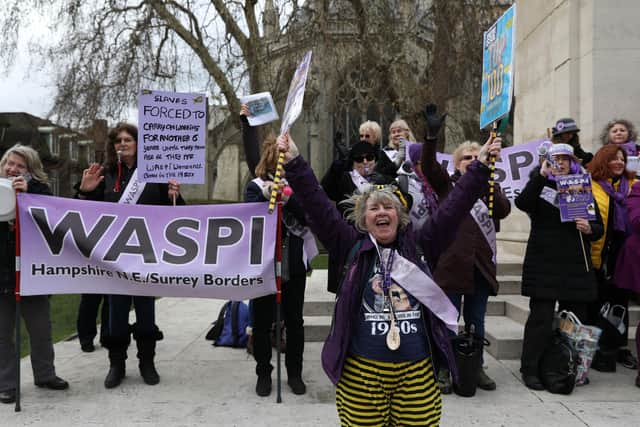WASPI campaign group hails 'milestone' victory in fight for pension compensation
The 1995 State Pension Act included plans to increase women's state pension age from 60 to 65, bringing it in line with mens, but WASPI campaigners argue that these increases were not communicated in such a way that women affected were able to make appropriate plans around them.
Earlier this year, the WASPI campaign group launched a judicial review, challenging decisions made in the Parliamentary and Health Service Ombudsman’s (PHSO) second stage report into the effects that the Government’s communications had on the women involved.
Advertisement
Hide AdAdvertisement
Hide AdThe PHSO has now voluntarily agreed to look again at the report, with a view to finding the “quickest route to a remedy” for those affected.


WASPI Chair Angela Madden said: “This is a real milestone on our very long journey to justice.
“Such a big victory would not have been possible without the support of thousands of ordinary women who dug deep to fund our case.
“Now we call on all political parties to commit to fast, fair compensation for WASPI women in their manifestos at the next election.
Advertisement
Hide AdAdvertisement
Hide Ad"With one of our number dying every 13 minutes, there’s not a second to waste in recognising the financial loss, hardship and trauma DWP’s incompetence has caused.”
To launch its judicial review, the WASPI campaign raised £120,000 from affected women.
The decision made by the PHSO to reassess the report, however, was made outside of court, and the judicial review has not currently taken place.
The Ombudsman also noted that the stage three report, and the financial remedy amount it recommended, will not necessarily change and that this would be reviewed in light of the second stage report being revisited.
Advertisement
Hide AdAdvertisement
Hide AdA PHSO spokesperson said: “We are confident that we have completed a fair and impartial investigation.
"As an independent Ombudsman, our duty is to provide the right outcome for all involved and make sure justice is achieved.
“Given the legal challenge brought against us, we have agreed to look again at part of our stage two report.
"We hope this cooperative approach will provide the quickest route to remedy for those affected and reduce the delay to the publication of our final report.”
Advertisement
Hide AdAdvertisement
Hide AdThe WASPI group was founded in 2015, and campaigns on behalf of women born in the 1950s, on or after April 6 1950 to April 5 1960.
As well as campaigning on issues related to the 1995 state pension age inscrease, the WASPI group also claims communication was not properly made in 2011, when the state pension age was raised from 65 to 66.
A Department for Work and Pensions spokesperson said: “The Government decided over 25 years ago it was going to make the State Pension age the same for men and women.
“Both the High Court and Court of Appeal have supported the actions of the DWP under successive governments dating back to 1995 and the Supreme Court refused the claimants permission to appeal.”
The current state pension age is 66 regardless of gender.
A decision to raise this to 68 was recently delayed until after the next general election.